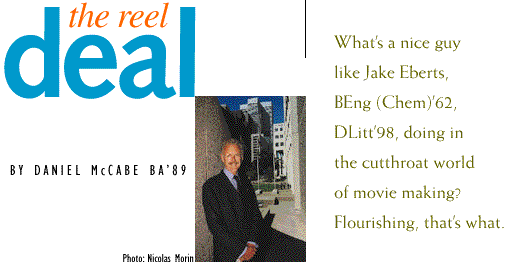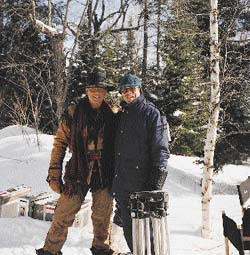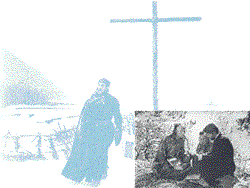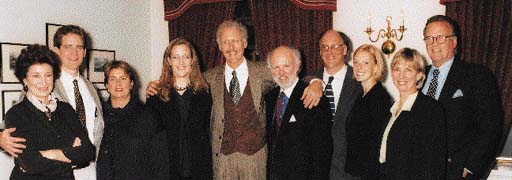 |
 | |||||
 | ||||||
 | ||||||
 | ||||||

Tall and slim, with curly hair and an easy smile, Jake Eberts doesn't look the part of a big-time movie producer. The stereotype says he should be loud and obnoxious with a penchant for drugs and other forms of fast-lane living, but Eberts is soft-spoken, even-tempered and has been happily married to the same woman for 30 years. If he has an addiction, it might be to tennis. Eberts has had a hand in making some of the most profitable and critically acclaimed movies of the last 20 years -- Gandhi, Chariots of Fire, A River Runs Through It, Dances With Wolves, The Killing Fields and Driving Miss Daisy, to name a few. The films he's helped develop and finance have earned 64 Oscar nominations and 27 Academy Awards. Robert Redford returns his phone calls. Just as the man doesn't fit the mould, neither do his films. When asked to describe a typical Jake Eberts movie, the producer responds, "I can tell you what kinds of movies I wouldn't make -- the big summer blockbusters. Godzilla, Armageddon, Something About Mary. I have no interest in making those sorts of films." His speciality is something else altogether -- thoughtful movies that manage to make money.
"Most people in our industry are either brilliant financially and almost cretinous artistically," says Attenborough, "or they are wonderfully exciting and innovative artistically with absolutely no business sense whatsoever. Someone like Jake, a talented businessman and a producer with a wonderful artistic sense, is really quite rare." That unusual combination of taste and savvy has won him international respect -- and led him back to McGill in October for a special event. The University awarded him an honorary degree for his contribution to the arts. "It's a terrific thrill," says Eberts. "When I was first told about it, I thought somebody was pulling my leg." McGill has played a special role in his family's life, he adds. His grandfather, a one-time chief surgeon at the Montreal General Hospital, was a McGill graduate. So were his father, his uncle and all of his siblings. His daughter Lindsey is slated to begin studying art history at McGill next year and his son Alexander is a recent alumnus, as are a number of his nieces and nephews. Movie making wasn't on Eberts's mind when he began his undergraduate studies at McGill. He liked films well enough, but preferred sports and nature walks. "I can't say that I had any great passion for engineering," Eberts admits. He opted for chemical engineering because he thought the degree would help him land a good job. Today he's more respectful of the education he received. "What engineering offers," says Eberts, "is training in how to solve problems -- that's what engineering is all about. With movies, there are always problems. With a big budget film, it's practically guaranteed that you'll be dealing with a disaster or two. But that's what I like about the job. Solving problems gives me a kick."
After graduating, he went to work for the French firm Air Liquide where he helped design and later build gas liquefaction plants in Europe. Eberts enjoyed the travel opportunities associated with the job -- spending time in remote regions of France, Italy and Spain -- but it soon turned into a boring routine and he saw little hope of advancing. So he went back to school, this time to Harvard for an MBA. That degree eventually led to a job on Wall Street, and from there Eberts moved to Oppenheimer and Co., a New York investment bank that was expanding its European offices. He was hired by the bank's London office. "In some respects, it was a great place to work," says Eberts of Oppenheimer. "They encouraged the people there to take on imaginative projects, things that were out of the ordinary." The problem was, not all of those projects panned out. Too many of them -- some managed by Eberts -- floundered. Although he was respected in the company and was promoted to managing director of the London office, by the mid-'70s Eberts was in serious financial trouble. Interest rates in Britain went through the roof during this period and Eberts found he couldn't meet his mortgage payments. He had to sell his house. He owed tens of thousands of dollars. Oppenheimer was struggling. It was a low point in his life. Coming from a large and accomplished family (four brothers and a sister), he felt he was the Eberts sibling who didn't amount to much.
There were missteps after Watership Down. A film called Zulu Dawn tanked at the box office, teaching Eberts an important lesson -- never to risk his own money on a movie. Still, he was getting a feel for the movie business and making valuable contacts. His name was becoming known in the film community. One day, Richard Attenborough looked him up. "I'll never forget the day I met Jake," says Attenborough. "He had a tiny upstairs office in north London. I went in and brought him the Gandhi script. He read it immediately. The next day, he invited me back. "He thought the script was deeply moving, but told me that none of the big companies were going to make the film. I said, 'You don't have to tell me, Jake. I've been trying for 20 years to persuade them to do it and nobody is interested.'" A movie about a skinny Indian pacifist just didn't have the look of a box office winner. But Eberts believed in the project. "He put together the financing absolutely brilliantly," remembers Attenborough, and in the process, created a movie company called Goldcrest Films. Gandhi ended up doing a lot better than the studio bosses ever imagined possible, winning eight Oscars in 1983, including the award for Best Film. The year before, another Goldcrest movie, Chariots Of Fire, had won four Oscars and was also named Best Film. Eberts, who'd felt like a failure a few years earlier, was now one of the most sought after men in the movie industry. Films like Local Hero, The Dresser and The Killing Fields soon followed, firmly establishing Goldcrest's reputation for making intelligent, challenging films that could turn a profit. But with success, the company grew larger -- too large for Eberts's liking. His partners had expanded Goldcrest into areas that he wasn't comfortable with -- the television industry, for instance. The pleasures associated with making movies had been overtaken by the grinding responsibilities involved with running a large business. After receiving an offer from another company -- one that would allow Eberts to focus on filmmaking -- he left the Goldcrest in 1984. A couple of years later, Eberts was back at Goldcrest, this time on a rescue mission. His successors didn't have his Midas touch for picking winning scripts. The company was on the ropes awaiting the release of three big-budget films that Eberts had little enthusiasm for -- Absolute Beginners, The Mission and Revolution. The Mission, starring Robert de Niro and Jeremy Irons, was a worthwhile project but with limited appeal. The other two movies were out-and-out disasters. First out of the gate was Absolute Beginners. Eberts recognized the film for what it was -- a disjointed mess that was over-hyped to boot. He put on his best poker face and told the trade papers he thought it was going to do well. "I hate selling something I don't believe in," says Eberts. "But what choice did I have? I had a payroll to meet. There were 50 people on staff whose livelihoods depended on what I did."
He helped Goldcrest survive -- albeit in a much reduced capacity. Specializing in distribution, Goldcrest will probably never be a major moviemaker again. As for Eberts, he struck out on his own, once more forming a tiny company to develop and produce films. Ask him to select the movie that's dearest to his heart and Eberts says he just can't. It's like asking a mother to choose her favourite child. He quickly talks up the merits of seven or eight of them. If he can't identify a single favourite film, he's quick to name the worst movie he's ever made. "Super Mario Brothers, unquestionably. It took me years to get over that -- I was disgusted with myself. This was a case where I took on a project I didn't really care for because I thought we could make money with it. It was a hot property and I thought it would sell. It flopped. More important, it just wasn't a good movie -- the screenplay was poor, the directing was poor. "I learned a lesson from that experience. I have to make movies that I believe in. There is no joy in it otherwise." Eberts has learned other lessons along the way. In a book he co-wrote about his Goldcrest experience, My Indecision is Final, Eberts related how the movie industry wore him out in the 1980s. "I never stopped thinking about the business: twenty-four hours a day, seven days a week -- I couldn't hold an intelligent conversation with my kids." He has a better handle on the pressures now. "You just learn how to discipline yourself. You realize you've got to have a life. That's part of the reason I moved to Paris. In London, I was too accessible. Everybody knew me." Eberts argues that much of his success stems from the fact that he isn't based in Hollywood. He lives in Paris, his office is in London and he and his family spend part of each summer at a home in the Eastern Townships. "People in Hollywood talk to each other all day long and then they go out for dinner with each other at night. They have no experience of what life is like outside the film industry. The egos are huge, but in the end, they usually make bad movies. If I lived there, I would have been sucked into that world." So did Robert Altman get it right in The Player, when he portrayed Hollywood as a land of grinning back-stabbers? "Oh, it's much worse than that," Eberts laughs. "There are probably more truly awful people in the film industry than there are in any other business. Not at the independent production level, mind you. All the nonsense tends to go on at the major studios. They see nothing wrong with lying -- it's all part of the business to them. But there are absolutely terrific people in this industry, too. And there are enough of them around for me to make films with." In the wake of two recent Oscar nominations for Atom Egoyan's The Sweet Hereafter, Eberts says he's impressed by how far the movie industry has come in this country. "It's amazing to see how Canadian film has progressed. There is a lot going for the movie industry here -- terrific actors, talented directors, outstanding film crews, beautiful locations. The Canadian dollar helps, too. If there is one weakness, I would say that Canada doesn't have enough good writers. But that's true of Los Angeles as well." Eberts is doing his part to nurture young writers -- directors, actors and other artists, too. He chairs a fund in London that sponsors work by new scriptwriters, raises money for the Piggery Theatre in North Hatley, Quebec, and is a trustee of Robert Redford's Sundance Institute, which is widely credited with playing a key role in supporting young filmmakers. Eberts has also been back to McGill on several occasions to show his films and share his experiences with cultural studies students. Other causes he's supported include the fight against muscular dystrophy and diabetes and conservation efforts involving the St. Lawrence River. His interest in the environment played a role in his decision to get involved in Attenborough's Grey Owl, a film that stars Pierce Brosnan as the real-life Archie Belaney, a British naturalist who achieved international fame, all the while masquerading as a Canadian aboriginal. As a producer, Eberts looks after buying the rights to a property (often a book), finds a director, raises money for the movie, figures out how the film will be distributed and markets the picture. Together with the director, he decides on the script and the lead actors. Over the years Eberts has worked with directors like Terry Gilliam (Baron Munchausen) and Terry Jones (Wind in the Willows) who have a reputation for being difficult. But Eberts says he's never had a problem with temperamental directors. "They tend to care more. I almost seek them out. It's fine as long as you're both committed to making the same movie," says Eberts. "The trick is to get everything settled before the cameras start filming. Do we see the story the same way? Do we both want the movie to go in the same direction? If not, then you shake hands and you walk away." So what attracts Jake Eberts's attention to a possible film? "I like true stories. Almost all the films I've helped make have been based on real events -- even Dances With Wolves wasn't completely made up. Much of it was based on facts. I don't read novels. I can't relate to pure fabrication." There's another factor. "Two weeks after they've seen one of our films, I want people to still be thinking about it. I don't want these movies to just be about killing two hours." Next up for Eberts is Bagger Vance, a golf film to be directed and co-produced by his friend Redford (the two worked together on A River Runs Through It). Eberts is also producing Chicken Run, a "prisoner of war" film featuring a cast of animated poultry. Nick Park, the Oscar-winning creator of Wallace and Gromit, is co-directing. Despite the success his films have enjoyed with Oscar voters, Eberts doesn't have an Academy Award of his own. Producers win Oscars if the movie garners a prize for Best Picture, but the films that Eberts has officially produced haven't captured that particular prize yet. He came close once. Attenborough tried to convince Eberts to accept official credit for producing Gandhi, but he refused, saying that his company ought to get the credit instead. It was a selfless impulse that cost Eberts an Oscar. "To be honest, it doesn't bother me at all. I'm just ecstatic that my films have won so many awards," Eberts insists. Maybe so. But before Jake Eberts is done making movies, it seems a safe bet that one of those golden statuettes will be adorning his mantel. Daniel McCabe is editor of the McGill Reporter, the campus newspaper for faculty and staff. | ||||||



